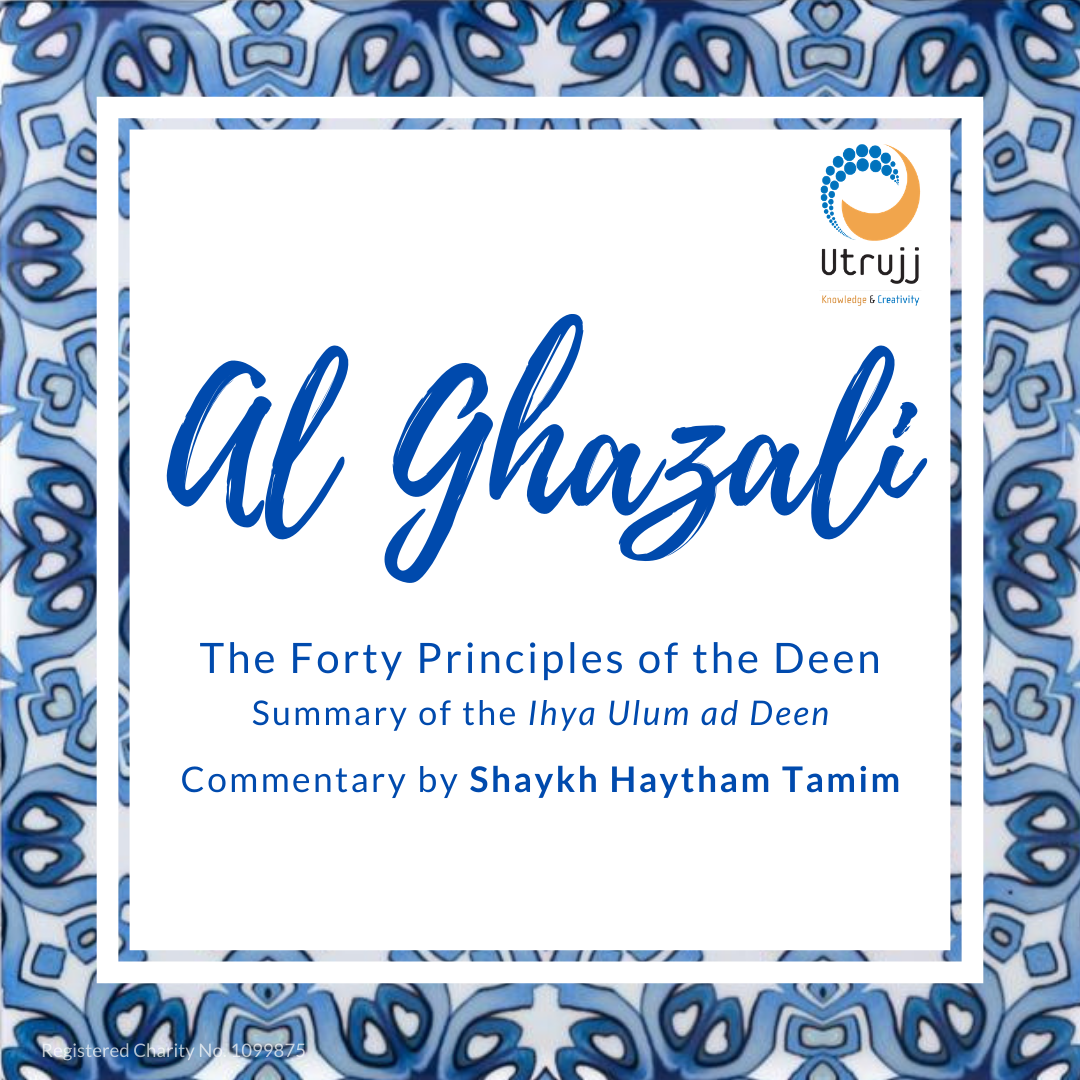Ghazali on purity

Imam Ghazali’s Kitaab Al-Arba’in Fi Usul ad-Din, The Forty Principles of the Religion, which he wrote before his death is a summary of his life’s works and thoughts, and his major work, the lengthy and detailed Ihya Ulum ad-Din.
As we go through his work, we have to bear in mind that Imam Ghazali has quoted some weak hadith, and where this is the case, I will point them out.
In his chapter entitled Tazkiya al Qulub, The Purification of the Heart, he pinpoints the blameworthy characteristics we need to extract from our heart. This is a very dear and important topic to every single one of us.
Quranic quotes
Tazkiyah is purification The Quran states clearly Qad ‘aflaha man-zakkah and Qad ‘aflaha man-tazakka
so he who purifies it is surely successful. [91:9]
Successful is the one who purified it. [87:14]
Prophet Ibrahim’s (peace be upon him) supplication of acceptance
When the Prophet Ibrahim (peace be upon him) was building the Kaaba, he made a supplication
Rabbana ta-qabbal minna; ‘innaka ‘Antas-Samee-‘ul Aleem.
And ˹remember˺ when Abraham raised the foundation of the House with Ishmael, ˹both praying,˺ “Our Lord! Accept ˹this˺ from us. You are indeed the All-Hearing, All-Knowing. [2:127]
He called upon Allah to accept this work from his son Ismail and himself. He in his 80-90s and his teenage son, Ismail had built the Kaaba together. His dua reflects his sincerity and left a lasting lesson for us, not to be complacent that any of our deeds will be accepted. Whenever we do any obligation, or fulfil any command, don’t just tick the box and think you’re done. Always ask Allah to accept it from you. No matter how well you think you did it or how many conditions you think you fulfilled or etiquettes you followed, because you never know if your action has been accepted or not.
When you ask for it, make sure you mean it.
Then Ibrahim said:
Rabbana waj-‘alna Muslimayni laka wa min-zurriyyatina ‘Ummatam Muslimatal-lak; wa’arina manasikana wa tub’alayna; ‘innaka ‘Antat-Tawwabur-Raheem
Our Lord! Make us both ˹fully˺ submit to You and from our descendants a nation that will submit to you. Show us our rituals, and turn to us in grace. You are truly the Accepter of Repentance, Most Merciful. [2:128]
And then Ibrahim (peace be upon him), in Makkah, made dua for our ummah, saying:
Rabbana wab’ath feehim Rasoulam-minhum yatlou ‘alayhim ‘ayatika was yu’allimuhumul-Kitaba wal-Hikmata wa yuzakkeehim; innaka ‘Antal-‘Azeezul-Hakeem
Our Lord! Raise from among them a messenger who will recite to them Your revelations, teach them the Book and wisdom, and purify them. Indeed, You ˹alone˺ are the Almighty, All-Wise. [2:129]
He specifically asked for the people of Makkah, where his son grew up, amongst the Arabs (though they themselves were from Iraq) that they would be sent a messenger who teach them about Allah and purify them. Yuzakkeehim (purify them) is the core of the ayah and whenever we refer to purification it stems from tazkiya.
Acceptance of Prophet Ibrahim’s supplication
As the Prophet Muhammad (peace be on him) was the answer to Ibrahim’s dua, the messenger from their community, in some narrations the Prophet (peace be upon him) said:
I am the supplication of my father Ibrahim. (ibn Hisham, Tabari)
This is why when we do attahiyatin our salah, we include Ibrahim (peace be upon him) as a payback for his supplication, which Allah Almighty accepted and sent from that Makkan community, Muhammad (peace be upon him), the light for the whole of the world, for humanity.
The Prophet (peace be on him) would fulfil the dua of Ibrahim (peace be upon him) by:
- Reciting the revelation
- Teaching the Book
- Teaching the Wisdom
- Purifying them.
This ayah is so beautiful and it’s one of my favourite verses as well.
Messenger from the same community
The fact that the Prophet (peace be on him) came from their community is significant as he could communicate with them in their language; he knew their customs and their traditions, and he knew their mentality, and their history. He was not a stranger to them. This is an important point and lesson to us. When we consider delivering a message to any community, we need to choose the right person from the community, not an alien who will be parachuted into their midst, as that will create barriers to its acceptance.
Overseas online fatwas
We can extend this point to online fatwas and online advice etc. If the one who’s delivering this doesn’t live in the community; he doesn’t know the ins and outs of the community, or the reality, he will not necessarily give the right guidance. Therefore be careful of overseas fatwas unless they are related to matters of belief, as they might be inappropriate for your reality – the norms, culture and customs where you live.
Importance of communication
In Surat Ibrahim, Allah Almighty says, ‘Wa ma ‘arsalna mir-rasoulin ‘illa bi-lisani qaw-mihee
‘We have never sent a messenger but in the language of his people’ [14:4]
This confirms the importance of communication. Often we lost a vital component of the message during translation. It can change the whole story, or the instruction. It might divert you off track if you didn’t understand.
I remember when I was having my house refurbished I had a Chinese builder; who was very dedicated, honest and hardworking, but our communication was fraught with difficulties. We had many misunderstandings, including a wall which he knocked down because he misunderstood what I said.
The mission of all prophets and the messengers and the callers to Allah Almighty is to convey the message clearly, in the best style. In today’s world, this means putting it out on the best platforms, with the most creative means of communication; which is up-to-date and on people’s wavelength.
It is the job of the prophets to make the message accessible to everyone, and ensuring that no matter what level of education the audience has, that they can engage with it and understand it. So we too when we are spreading the message, have to make it easy for people to understand.
Recitation of the Quran
Ibrahim (peace be on him) prayed for a messenger that recites the revelation. I have delivered several talks on the effect of hearing Quranic recitation even when you do not understand it. The miracle of the Quran, the word of Allah Almighty, is that it has special powers – to give you tranquillity and to cure you and to protect you. You do not feel this in the translation. The attributes of the word of Allah Almighty are beyond comprehension. Recitation of the Quran is therefore important, not only in our salah, but on a regular basis, as the angels descend and it brings barakah to your life.
We have seen videos of non-Muslims having the Quran played to them without being told and though they do not understand what it means, they find it soothing and beautiful. The Quran, being divine and with its own unique rhythm and rhyme, is unlike any other collection of words, poetry or prose.
Command to learn the Quran
Ibrahim (peace be upon him) asked Allah Almighty to send a messenger to teach the book yu’allimuhumul-Kitaba [2:129], because it’s the manual for our life; as well as the manual for after our life, as it teaches us about the dunya and the akhirah. This is why we need to learn it and no wonder the first verse was Iqra bismi Rabbikallazee khalaq ‘Read in the name of your Lord who created you’ [96:1]. Grammatically iqra is in the command form, so you have no choice, you have to learn.
In some narrations the Prophet (peace be upon him) said I have been sent as a teacher. He was the best teacher. Jabir ibn Abdullah reported that the Messenger of Allah (peace be upon him) said:
عَنْ جَابِرِ بْنِ عَبْدِ اللَّهِ قَالَ قَالَ رَسُولُ اللَّهِ صَلَّى اللَّهُ عَلَيْهِ وَسَلَّمَ إِنَّ اللَّهَ لَمْ يَبْعَثْنِي مُعَنِّتًا وَلَا مُتَعَنِّتًا وَلَكِنْ بَعَثَنِي مُعَلِّمًا مُيَسِّرًا
“Verily, Allah did not send me to be harsh or obstinate, rather He sent me to teach and to put at ease.” (Muslim)
The Sunnah of the Prophet (peace be upon him)
Ibrahim asked for the messenger to teach wisdom in addition to teaching the Book of Allah Almighty; wal-Hikmata [2:129]; which is a source of discussion among scholars. The majority of the translations say wisdom, but in other commentaries on the Quran wal-Hikmata means the Sunnah of the Prophet (peace be upon him).
Sunnah is al hikmah because the Prophet (peace be upon him) said he had been given the Quran and something like it. Al-Miqdam ibn Ma’di reported that the Messenger of Allah (peace be upon him) said:
“I have surely been given the Quran and something like it along with it” (Abu Dawood)
The Sunnah is the explanation of the Quran. You can’t understand the Quran without the Sunnah.
Purification
The last thing Ibrahim asked for was wa yuzakkeehim [2:129] ‘purify them’. Ibrahim (peace be upon him) is the father of all the prophets; one of the five resolute messengers Ulul Azam, alongside Nuh, Ibrahim, Musa, Eesa and Prophet Muhammad (peace be upon them). He knew the importance of purification and its connection with eternal success:
Qad ‘aflaha man-zakkaha
so he who purifies it is surely successful, [91:9]
Qad ‘aflaha man-tazakka [87:14]
Successful is the one who purifies it. [87:14]
Tazkiya is a science. It is about attaining purity of the heart and aligning the inward and the outward.
Half of faith is purity
Abu Malik al-Ashari reported that the Messenger of Allah (peace be upon him) said:
عَنْ أَبِي مَالِكٍ الْأَشْعَرِيِّ قَالَ قَالَ رَسُولُ اللَّهِ صَلَّى اللَّهُ عَلَيْهِ وَسَلَّمَ الطُّهُورُ شَطْرُ الْإِيمَانِ وَالْحَمْدُ لِلَّهِ تَمْلَأُ الْمِيزَانَ وَسُبْحَانَ اللَّهِ وَالْحَمْدُ لِلَّهِ تَمْلَآَنِ أَوْ تَمْلَأُ مَا بَيْنَ السَّمَاوَاتِ وَالْأَرْضِ وَالصَّلَاةُ نُورٌ وَالصَّدَقَةُ بُرْهَانٌ وَالصَّبْرُ ضِيَاءٌ وَالْقُرْآنُ حُجَّةٌ لَكَ أَوْ عَلَيْكَ كُلُّ النَّاسِ يَغْدُو فَبَايِعٌ نَفْسَهُ فَمُعْتِقُهَا أَوْ مُوبِقُهَ
“Purity is half of faith, and the praise of Allah fills the scale. Glorification and praise fill up what is between the heavens and the earth. Prayer is a light, charity is proof, and patience is illumination. The Quran is a proof for you or against you. (Muslim)
What does it mean half of faith is purity? This is one of the very important hadith. Scholars have commented a great deal on it, including Imam Nawawi, Iman Ahmad Hambal, Ibn Hajar Asqalani in different ways.
Firstly purity is outward purity (tuhur). We achieve this outward purity by wudu. Iswudu is half of your imaan? The broader meaning is that purification of the body, such as washing off filth, showering (ghusl) and keeping it clean is half of imaan because you need it in order to pray. You cannot pray if you are not pure. Impurity prevents you from salah.
Allah Almighty in the Quran calls the salah imaan. This is the main explanation of the hadith.
Inward and Outward Realms
Previously Imam Ghazali (may Allah have mercy on him) mentioned the connection between the two realms alam ul mulk and alam ul malakut, the outward physical world and the unseen world. He said that wudu and ghusl have an impact on our inner being, and purify it.
We have to give due importance to purify our body, our clothes, and the space where we pray. All these purities are required for salah to be accepted. Without doubt the fourth purity is intention. Why are you praying? Not because you have been told to pray or because you are on autopilot, this kind of salah will not benefit you. I’m not saying you shouldn’t pray if you are praying on autopilot, but that you should and improve the quality of your intention and your attention in your salah. Improve the presence of your heart, as salah with khushoo will make you a better person.
You need to fix both the outward and the inward. Half of it is inward, and the other half is the outward physical actions.
Story of the Bedouin
Talha bin ‘Ubaidullah narrated:
A Bedouin with unkempt hair came to Allah’s Messenger (ﷺ) and said, “O Allah’s Messenger (ﷺ)! Inform me what Allah has made compulsory for me as regards the prayers.” He replied: “You have to offer perfectly the five compulsory prayers in a day and night (24 hours), unless you want to pray Nawafil.” The Bedouin further asked, “Inform me what Allah has made compulsory for me as regards fasting.” He replied, “You have to fast during the whole month of Ramadan, unless you want to fast more as Nawafil.” The Bedouin further asked, “Tell me how much Zakat Allah has enjoined on me.” Thus, Allah’s Messenger (ﷺ) informed him about all the rules (i.e. fundamentals) of Islam. The Bedouin then said, “By Him Who has honoured you, I will neither perform any Nawafil nor will I decrease what Allah has enjoined on me. Allah’s Messenger (ﷺ) said, “If he is saying the truth, he will succeed (or he will be granted Paradise). (Bukhari)
We see here that the Prophet (peace be on him) made the concepts easy to grasp and to do. In this very hadith the Prophet (peace be upon him) is talking about the outward purification, cleanliness etc. and the inward purification indirectly which is purifying the heart from filthy characteristics and traits. This is exactly what Imam Ghazali (may Allah have mercy on him) is addressing in this chapter.
Opposites
We cannot talk about purity unless we know what filth is. Opposites help you understand concepts, for instance we understand light when it compare it to darkness.
You don’t put perfume if you are not clean. So you need to clean yourself first, take a shower and wash yourself and then you can put perfume on and beautify yourself. You don’t beautify yourself with filth on your body etc. Tazkiyah comes first, and beautification and perfume come later.
Shaykh Haytham Tamim – The Thursday Al Ghazali Class
Transcribed by Rose Roslan
Related posts
Why is following the sunnah the key to success. Ghazali’s secrets part 1
What is wrong with excessive laughter?
Do you have to practice what you preach?
Self righteousness when giving counsel
Brotherhood, friendship and wilayah
How to deal with difficult neighbours
The first 6 rules of how to deal with people
How to deal with people according to their status (9-11)
Cover the faults of others (12-13)
Defend others in their absence, be tactful, be cautious of the company of the rich (16-18)
- Cover the faults of others. Ghazali’s Rules 12-13 for dealing with people.
- How to deal with people according to their status. Ghazali rule 9-11
- Dealing with gossip and arguments. How to deal with people: Ghazali’s rules 7-8
- What do we learn from the Euros 2020? Lessons on success
- Should you only drink while sitting down?


Recommended Posts

Don’t be a Ramadani person – Be a Rabbani person.
April 10, 2024

The test of will – Tarawih Reflections 30
April 09, 2024

